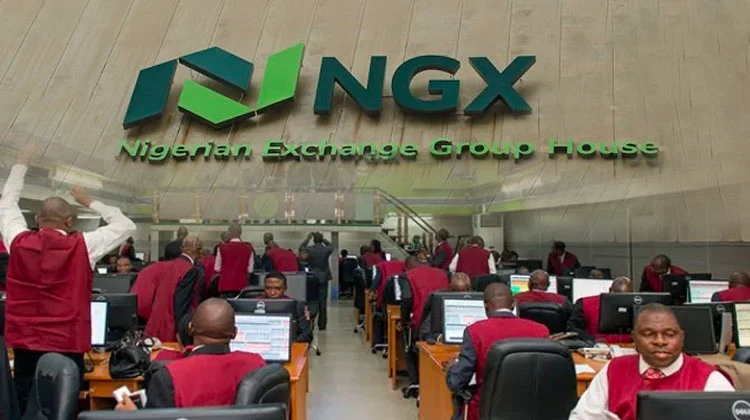
Telecoms, banking, and consumer goods sectors drive sharp selloffs as investors react to global uncertainty…
Stocks in the Nigerian Exchange (NGX) Stocks Worth Over One Trillion (SWOOTs) club plunged by approximately ₦2.75 trillion, or 3.2%, over the past week, closing with a combined market capitalization of ₦83.34 trillion as of November 10, 2025.
The elite group made up of 22 heavyweight companies now accounts for 88.16% of the NGX’s total equity capitalization of ₦94.53 trillion, leaving just 11.84% for over 100 other listed firms.
The decline marks a major retreat from the ₦86.09 trillion recorded on October 31, 2025, reflecting growing bearish sentiment and widespread profit-taking across key market sectors.
Telecoms, Banks, and Consumer Goods Lead the Slide
Market analysts attributed the week’s downturn to profit-taking, weakened investor confidence, and price corrections across several high-value counters, particularly in telecommunications, banking, and consumer goods.
The biggest drag came from:
- Telecoms (MTN Nigeria, Airtel Africa): over ₦1.05 trillion loss combined.
- Tier-1 Banks (GTCO, Zenith, Access, UBA, First HoldCo): cumulative ₦545.13 billion decline in six trading sessions, wiping out about 5.4% of total value.
- Consumer Goods (Nestlé, Nigerian Breweries, International Breweries): down ₦611.10 billion, representing a 10.4% contraction in sectoral value.
- Industrial & Energy Stocks (Aradel Holdings, Lafarge Africa): shed about ₦425.21 billion combined.
A few gainers such as Okomu Oil and Stanbic IBTC provided mild support but were not enough to offset the widespread losses.
Banking Sector Takes Heavy Hit
The banking sector was among the worst hit, with a combined ₦545 billion wiped off Tier-1 counters in one week.
- UBA Plc: down ₦82.07 billion (−4.99%), closing at ₦38.05 per share.
- Zenith Bank: fell ₦139.63 billion (−5.4%) to ₦59.60 per share.
- Access Holdings: plunged ₦141.3 billion (−10.83%) to ₦21.80 per share.
- GTCO: dropped ₦182.13 billion (−5.6%) to ₦84.50 per share.
- Stanbic IBTC Holdings: gained ₦5.56 billion (+0.31%), while First HoldCo closed flat at ₦1.319 trillion.
Telecom Giants Deep in the Red
Telecom stocks recorded the largest nominal declines:
- MTN Nigeria: lost ₦904.91 billion (−8.2%), falling to ₦10.014 trillion in value.
- Airtel Africa: shed ₦152.21 billion (−1.75%), closing at ₦8.531 trillion.
Industrial, Energy, and Consumer Goods Slide
Among industrial and energy majors, Lafarge Africa dropped ₦144.97 billion (−6.42%), while Aradel Holdings fell ₦280.24 billion (−8.24%).
Meanwhile, Dangote Cement, BUA Cement, and Seplat Energy held steady.
In the consumer goods category:
- Nestlé Nigeria: down ₦146.64 billion (−9.66%) to ₦1.371 trillion.
- Nigerian Breweries: declined ₦195.2 billion (−8.81%).
- International Breweries: lost ₦269.27 billion (−12.7%).
- BUA Foods remained stable at ₦12.465 trillion.
Oil Palm, Power, and Hospitality Stocks Stable
Okomu Oil gained ₦28.62 billion (+2.78%) to close at ₦1.058 trillion, while Presco Plc held firm at ₦1.48 trillion.
Power and hospitality stocks including Transcorp Power, Geregu Power, and Transcorp Hotels remained unchanged.
SWOOTs Snapshot (as of November 10, 2025)
| Company | Market Cap (₦ Trillion) | Share Price (₦) |
| BUA Foods | 12.47 | 692.50 |
| Dangote Cement | 11.14 | 660.00 |
| MTN Nigeria | 10.01 | 477.00 |
| Airtel Africa | 8.53 | 2,270.00 |
| BUA Cement | 6.10 | 180.00 |
| Seplat Energy | 3.55 | 5,917.20 |
| Aradel Holdings | 3.12 | 717.50 |
| GTCO | 3.08 | 84.50 |
| Geregu Power | 2.85 | 1,141.50 |
| Transcorp Power | 2.57 | 342.00 |
| Zenith Bank | 2.44 | 59.60 |
| Nigerian Breweries | 2.02 | 65.20 |
| Lafarge Africa | 2.11 | 131.00 |
| Int’l Breweries | 1.85 | 11.00 |
| Transcorp Hotels | 1.79 | 174.90 |
| Stanbic IBTC | 1.79 | 112.35 |
| UBA | 1.56 | 38.05 |
| Presco | 1.48 | 1,480.00 |
| Nestlé Nigeria | 1.37 | 1,730.00 |
| FBN Holdings | 1.31 | 31.50 |
| Access Holdings | 1.16 | 21.80 |
| Okomu Oil | 1.06 | 1,110.00 |
Bottom Line
Despite the recent decline, the SWOOTs remain the dominant force in Nigeria’s capital market, controlling nearly nine-tenths of total market value. Analysts, however, caution that unless global and policy uncertainties ease, short-term volatility could persist.



